Since the demise of the Old National Library in 2004, I have read many netizens reminisce about our national icon; the more nostalgic ones even blogged about their pilgrimage to its ruins - a pair of wretched red pillars standing forlorn on the grassy patch. Finally in 2010 the turn came for me to make the pilgrimage. As I trampled up and down on what was once Stamford Road, comparing what I read with what I was seeing, my mind just kept screaming - bo ko leng, bo ko leng, this cannot be the second shot.
There is no lack of photos of the Old National Library. In fact NLB organized tours for the public to have a final glimpse of the building before it was demolished and the photographers must had enjoyed themselves shooting every nook and cranny. The wretched pillars were probably the last thing in their agenda. At that time most people would not have imagined a "last pillar standing" after the building has perished; till today some people are still surprised by the longevity of these pillars that used to mark the entrance to the Old National Library.
If you search SNAP for photos of these pillars, you get tons of astonishing results that show the library building and fence (with the pillars) taken from the same location and angle. What uncreative imagination! Perhaps the relevant authorities did erect a permanent tripod across the road to facilitate the shooting of these "postcard pictures" over the years (note the sudden appearance of the bus stop in the last photo). Needless to say, the tripod suspect must have perished with the building.
Everyone's favourite angle of the Old National Library from the outside. All photos from SNAP. From top to bottom, source - here, here, here and here.
These pictures found their way into blogs, like some kind of obituary photo for the Old National Library when one revisits the place or as 'before and after' comparison with the red pillars still standing. We thank these netizens who preserve the building and its memories online (Another 1960s cousin, the National Theatre, was not so lucky. Blogs and digicams were nonexistent when it was demolished in 1986).
Unfortunately heritage is in danger of being misrepresented by some of these 'before and after' comparisons. The "postcard picture" of Old National Library and the red pillars are an insidious pairing, an illegitimate "second shot". The association works its way into our subconscious so that years later if the red pillars are still standing, readers, romantics and revisitors will imagine them as the grand entrance to the Old National Library, as depicted in the "postcard picture".
With due respect, I believe they are not trying to mislead us. Anyone who is guilty of misrepresentation is only committing an honest mistake. So let us move on.
After my
1. Nobody has done a second shot of the "postcard picture"
At least I have not found any evidence in cyberspace. Perhaps netizens are intimidated by the big black hole that is Fort Canning Tunnel - dubbed the ugliest tunnel in Singapore by some. If the library building used to sit on this standing sinkhole, any second shot would be blocked by the hedges along the road.
Source: Google Map. Beware of the big black hole (I think there is an ERP gantry at the other end). The second shot could be taken from behind the blue signboard but obstructed by the hedges.
2. Any attempt is probably a wrong shot
This follows from above. The next time you see the "postcard picture" together with a modern day shot of the red pillars, look closer. Most likely you are not seeing a second shot.
A second shot is still possible, however, if you can find a shot of Old National Library taken further down the road.
3. The only heritage marker is not for National Library
Searching high and low for a heritage marker that marks the National Library former site, I could not find any. This is unfortunate and unfair when you think how come the other prominent "National building" from the 1960s (now demolished) has one; its plaque describes it as "signifying a spirit of self help and nationhood in the early days of nation building". Perhaps the relevant authorities do not think the National Library as having any significant role in nation building.
Ironically a marker for the site exists, but it marks a different landmark, one which most people would not care much about. To add insult to injury, the Old National Library gets a brief mention - only a brief mention. The marker is not even heritage-friendly as it is not situated in its geographical context.
You will not see this marker (its description here) if you enter the National Museum or Fort Canning Park through the pair of surviving red pillars from the Old National Library days. Approach from the National Museum side instead.
4. I'm the first one to produce a second shot
I suspect, due to the marker's location, most visitors who glance at the photo of St Andrew's School on the marker do not realize that is the same fence they are seeing less than 30m away. The fence belongs to the museum but most of it have been torn down on the Stamford Road side to integrate the museum with its surrounding.
If my guess is right, the fence still standing today are the same ones you see in the photo of St Andrew's School on the marker.
Source: NAS. Most likely taken from MPH Building. We see the fence ending abruptly before St Andrew's School entrance.
Trying to replicate the above view but at ground level. Note the wretched red pillars. See why this cannot be a second shot for the "postcard picture"?
As I ponder over the significance of the fence, I realize they are like white elephants. In the early days the St Andrew's School compound had no fence so intruders had easy access to the museum ground after opening hours. The National Library later had a fence but the car park connecting it was not fenced (I think). Now I am wondering, the two library entrances .... do they even have a gate at all?
Are there any second shots of the wretched twin pillars? What can you find beyond the pillars today, on the hallowed ground of Old National Library? Join me in my future exploration!
Akan Datang: Our Favourite Red-Bricked Building



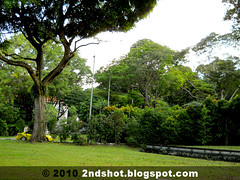
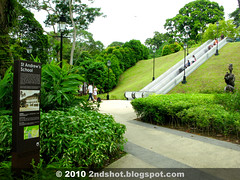
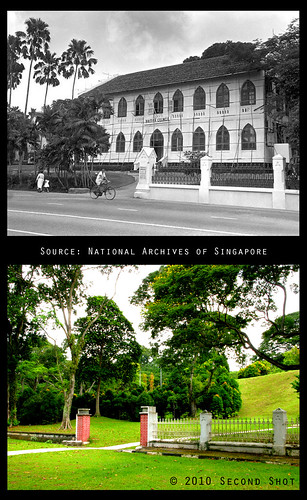
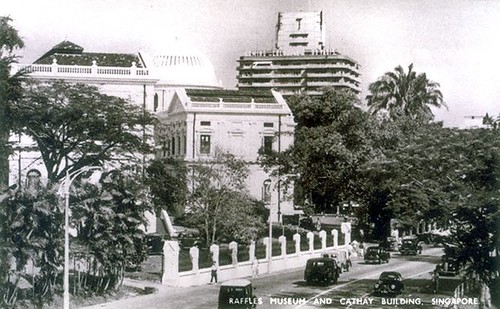
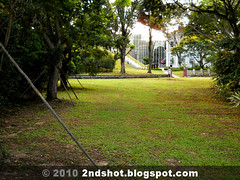
haha...wait for your "akan datang"...lol..
ReplyDeleteDo you still have the brick?
DeleteIcemoon. I support your hypothesis that these 2 'wretched pillars' are not part of the entrance to the former Nat Lib. Even though I had thought so earlier, I had always felt a little suspicious becos:
ReplyDelete1) The entrance was too narrow compared to the postcard photos.
2) More importantly, I found the pattern on the fence joined these pillars to be identical to those of the present National Museum. I thought at that time that the library and the museum probably shared a common fence. But now, reading your article, I begin to have my doubts.
Anyway, I took some close up photos of the the fence at the supposed library gate and compared them with old photos of the museum and noticed that the patterns were identical.
i cant remember where i read it off but i think the wretched pillars are not of the old nat lib! the ones in the postcard pics are the entrance and the current remaining ones are the exit?
ReplyDeleteThe wretched pillars will be covered in the 'akan datang'. Be prepared to see my second shot!
ReplyDeleteI still think the two wretched pillars are the ones shown in the 'postcard photo'. The fence and one of the wretched pillars originally belonged to St. Andrew School as shown in the National Archives photo.
ReplyDeleteMy guess is, when the school was demolished to make way for the National Library building, the pillar was modified or reconstructed with red bricks to match the library's red brick building. Another pillar was built on the un-fenced side to form a pair.
Just guessing.
Yeoman, in my last photo I tried to replicate the angle of the 'postcard photo'. If you enlarge my photo, you might change your mind :)
ReplyDeleteI agree with your guess on modification of pillar to match the building.